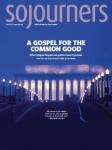DANIEL BELL'S The Economy of Desire juxtaposes Christianity and capitalism, situating both in the context of postmodernity. The main argument of the book is that performing works of mercy—both corporal and spiritual—constitutes an alternative economy that can resist capitalism. Capitalism, in Bell's construal, is an economic system founded on voluntary contracts, private property, and an ideological regime where the rule of the market transcends the rule of law and disregards the reign of God in Christ.
The author draws on the work of philosophers Michel Foucault and Gilles Deleuze to set up a philosophical framework for talking about power and desire. His treatment of Foucaultian insights on the ubiquity of power is meant to decenter the state as the primary engine of social change. Deleuze's work builds on Foucault's argument by conceptualizing people—and society at large—as flows of desire. Taken together, the claim is potentially but not necessarily democratic: Social structures organize desire in particular ways and are malleable due to the fact that power resides not only in the state or market but in the relational networks of everyday people. Under this account, for instance, the typical presidential election is not simply about securing votes, but about directing the aspirations and actions of the electorate toward a collective passion for growing the economy, expanding the middle class, and so on. Capitalism, for Bell, secures our loyalty because it shapes what we do as well as what we desire.
A few strengths of the book stand out. It contains a lucid discussion of the difference between commutative (fair contracts) and distributive (fair proportion of wealth, power, and other goods) justice within society. The scope of the author's analysis is also impressive. Bell substantively engages the arguments of diverse figures from Adam Smith, Milton Friedman, and Friedrich von Hayek to Augustine, Thomas Aquinas, and Martin Luther. Moreover, Bell's contention that proponents of capitalism effectively deny the possibility of social holiness is worth the price of the book.
Throughout The Economy of Desire, the author foreshadows his final argument that the works of mercy—physical acts of kindness such as feeding the hungry, as well as spiritual works such as comforting the afflicted—represent an economy of grace and love that resists the transactional status quo of capitalism. Bell argues that the works of mercy, in an Augustinian sense, heal our capacity to love from the distortions and disfigurations of capitalism. Moreover, this compendium of compassionate deeds, which are fully expounded in Aquinas' Summa Theologica, highlight philanthropy's evasion of justice and envision a sanctification of the individual in ecclesial community that reorders our respective households within the global capitalist system. Fair enough.
The problem, however, is that Bell's account overestimates the extent to which ecclesial works of mercy alone can reorder our individual desires. To implement the alternate economy of desire highlighted in the text requires an active civil sector and a government that can serve as a countervailing force to the market, in addition to the sanctified work of families and faith communities.
Bell's argument could also be strengthened by integrating an account of race and class into its treatment of desire. How, for instance, do the racialized cultural productions and consumer goods of capitalism shape our sense of who we are and who we could be? How do undocumented workers barraged by Fox News stereotypes and young black youth flooded with images of misogynist males in rap videos and so on heal desire? Incorporating these threads into the argumentative quilt of the book would heighten its persuasiveness.
I recommend The Economy of Desire to readers who are looking for an accessible and thoughtful treatment of the church's relationship to capitalism. Despite the insufficiency of Bell's constructive suggestions about the works of mercy, it is nevertheless a creative and robust proposal of a distinctly Christian vision of economics in the midst of the global capitalist economy.

Got something to say about what you're reading? We value your feedback!